 |
Campus community attends forum |
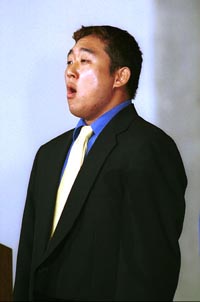 |
| Yun Chul Ko |
“Ours is a diverse campus, with a large contingent of international students living and studying side by side with many, many students from the affected areas of New York, New Jersey, Pennsylvania, Maryland and Virginia. The tragedies of last week could easily have provoked divisiveness, animosity and hatred. Instead, we have seen the University community come together as one in our common mourning,” Roselle said.
He gave special thanks to the faculty and staff and the Campus Religious and Spiritual Life Concerns Caucus, who provided many support activities for students during this trying time.
He also said, “I must take a moment to express regret that the forum falls on the second day of Rosh Hashanah, and we greatly appreciate the understating of our Jewish students, faculty and staff that the scheduling decision needed to balance many factors affecting our entire University community.”
Following a presentation of the colors by students representing
the Army and Air Force ROTC, junior music major Yun Chul Ko sang
the national anthem.
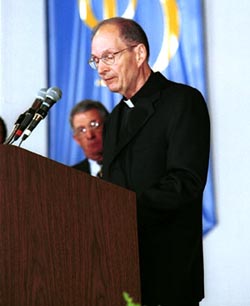 |
| Rev. Michael Szupper |
The Rev. Michael Szupper of St. Thomas More Oratory offered the invocation, referring to the chimes of the Memorial Hall carillon, which he said, “connects you to the past and calls you to the future. The past tells of the great men and women who felt called to carry burdens and wage long struggles for the common good. It is now our turn to cross the bridge into the future . . . . Alone—we fear; together—we push back the darkness. Alone—we question; together—our voices become a sound of strength and purpose. And we pray God to be with us on this journey, on this crossing.”
Corinne Bria, president of the DelawareUndergraduate
Student Congress, read from a poem she wrote on the evening of Sept. 11.
She spoke of how she, like others, had believed in the country’s invincibility,
and noted how her “ideas were changed forever.” But, at the end of her
presentation, words such as “disbelief,” “terror” and “fear” were replaced
with sentiments of “pride,” “peace” and “we will overcome.”
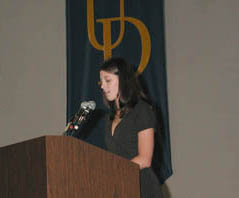 |
| Corinne Bria |
Ralph Begleiter, Distinguished Journalist in Residence and Rosenberg Professor of Communication, served as moderator of the forum. The former CNN news correspondent noted that the purpose of the forum was to pay respect to those who were victims of the tragedies and honor those who have been working to help their friends and country during the last week.
Begleiter said that, in times of crisis, it’s natural that citizens throughout the country look to its leaders for insight and guidance. He then introduced the forum’s main speaker, U.S. Sen. Joseph Biden, UD alumnus and chairman of the Senate Foreign Relations Committee.
Biden recalled a day nearly 40 years ago when he and his classmates were crammed into The Scrounge on campus to watch JFK tell about possible Russian missiles in Cuba.
While that crisis was eventually resolved, Biden said, the public now knows how close the country came to a showdown with the Soviet Union.
Biden said his mission at the forum was to tell students to have faith.
“Be not afraid,” he said. “This is not a time for fear. This is a time for a sense of proportion.”
If Americans fail to continue to work, or if they turn
on those of different racial and ethnic backgrounds, he said, then the
terrorists will have accomplished their goals.
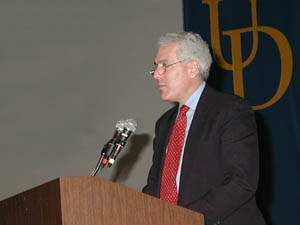 |
| Ralph Begleiter |
Referring to the 1941 attack on Pearl Harbor, Biden said the terrorists have again awakened America—the sleeping giant. “This is not the end of our way of life,” he said. “It’s the end of the way of life of international terrorist organizations.”
While Biden noted that many challenges lay ahead, he said the campaign against terrorism would not be a war in the traditional or conventional sense, with hundreds of thousands of military personnel amassing and ground troops invading another country.
Biden also said that while he did not think a military draft would be necessary, he was sure members of the latest generation were up to whatever challenges they were called upon to make.
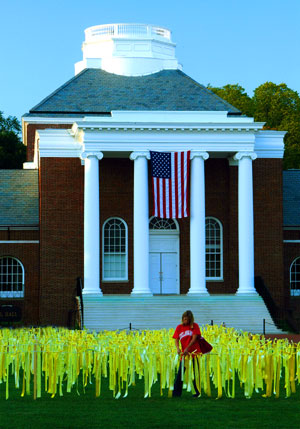 “If I hear one more commentator talk about your generation not being up
to it!” Biden said. “ I’ve have had it up to here!”
“If I hear one more commentator talk about your generation not being up
to it!” Biden said. “ I’ve have had it up to here!”
Although the generation of World War II has been called “the greatest generation,” Biden said it was not until America was attacked at Pearl Harbor that members of that generation accepted the challenge and earned the title.
“The reason they were the greatest is they faced the greatest challenge,” Biden said. “They were no better than you . . . The only difference is that you are a whole lot smarter than we were—that’s the only difference.”
Matthew Davis and Lion Gardner, graduate students in communication, picked up on Biden’s reference to each generation being capable of rising to the challenges with which it’s faced.
“Many have questioned whether our generation is capable of making the decisions that lie before us,” Davis said. “The explosions of last week have unveiled the strength of our generation. It is our duty to seize this opportunity.”
Gardner noted that the changes caused by the tragedies were not only physical. “The most severe and enduring changes,” he said, “are the ones that have occurred inside each of us.”
Lisa Daniels, a junior majoring in political science and international relations, said she watched in utter disbelief as her country fell victim last Tuesday to what most Americans have only witnessed in movies or read about in books.
She also said she had strong feelings watching students in the Ribbon Garden near Memorial Hall as they hung yellow ribbons in remembrance of the victims of the tragedy.
“As I tied my own ribbon to the rope, I stepped back and gazed for a second at all the yellow ribbons blowing softly in the breeze,” Daniels said. “My mind traveled back to the Gulf War, I had tied a ribbon outside my house then, too. But unlike then, the feeling that overwhelms me now is not revenge. It is fear.”
Daniels also spoke of the need for Americans to reach
down and find “the America in all of us. We will prevail, we will pull
through, and we will survive. These colors don’t run,” she said.
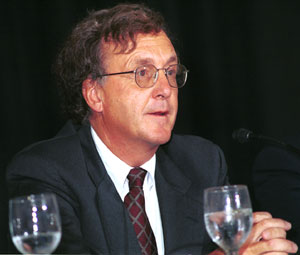 |
| Mark Miller |
Mark Miller, professor of political science and international relations and an expert on understanding terrorism, said there is no scholarly consensus on the definition of political terrorism, and described it as “the use of violence against civilian targets.” He noted how the difficult task of defining America’s enemies has changed markedly since the end of World War II.
He talked about the “spatial dislocation of conflict and violence,” and said we need to understand the reasons people direct violence against the United States and that our security very much hinges on how we respond to political extremists.
“The analogy drawn between the events of Sept. 11, 2001, and Pearl Harbor (Dec. 7, 1941), is understandable, but in major respects, flawed,” Miller said. “The violence perpetuated on Sept. 11 was terrorism because it was targeted at civilians. It, too, constituted an act of war, but the nature of war and conflict now is very different from that of World War II.”
Vice Provost Bobby Gempesaw reminded the audience
that although the nation is in mourning and people are crying out for justice,
we must be sensitive to the predicament of immigrants and other foreigners
who now find themselves targets of anger and frustration.
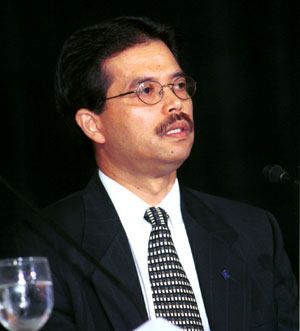 |
| Bobby Gempesaw |
“In reality, many of the victims of this horrendous tragedy were immigrants from as many as 62 countries,” Gempesaw said. “The challenge for the United States of America as a leader in the global community is how to defend and uphold its values without violating them in the process.”
Like others, Mark Cutrona, a senior majoring in political science and international relations, commented on the shock he had experienced Sept. 11. He also said, “I have taken our freedoms for granted in the past, and now I’m taking it for granted that I will still have our freedoms and the government has restored our sense of security. But I don’t know if I should be taking anything for granted after these attacks, especially after I read the words of our third president, Thomas Jefferson, who said, ‘Those who desire to give up freedom in order to gain security, will not have, nor do they deserve, either one.”
English graduate student Lejla Kucukalic mentioned that she had escaped atrocities of war in her hometown of Sarajevo, the capital of Bosnia and Herzegovina, adding, “Last week’s attacks in the U.S. are trying for me because they recall the burden of my past and unspeakable sadness.”
She said that, despite the tremendous pain many feel, “the United States is still the country of the future, regaining its stability and continuing to stand upright. I know that love and compassion are the only forces of ordinary people that can bring back normal life.”
Speaking from the military perspective, Lt. Col. Paul Pusecker, executive officer in the College of Arts and Science and former professor of military science at UD, spoke of the country’s military readiness and his personal connection to last week’s terrorist attacks.
Pusecker mentioned the Army’s new slogan, “An Army of One,” that replaced “Be all that you can be,” and then went on to talk about a particular member of the U.S. Army, his best friend and his daughter’s godfather, Lt. Col. Neil Hyland, who died when one of the hijacked planes crashed into the Pentagon.
“I tell you,” Pusecker said, “that you should feel reassured
that your armed forces are trained, ready and willing to do what we are
called upon to do and it will be done to the absolute best of our ability
.... we will fight and we will win our nation’s wars as we have for over
226 years.... Please keep in mind all the members of the Army of One and
the armed forces in your prayers.”
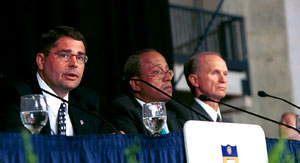 |
| Paul Pusecker, Leland Ware and John Bishop |
Ware said, “The sleeping giant has been awakened. I believe that the terrorists made a fatal tactical mistake, because the entire country in now unified in its resolve to exact retribution from those responsible for the heinous acts of mass murder. It may take some time, but I am confident that the American military and law enforcement officials will find those responsible for the attacks and exact retribution.”
Ware added that it was important that emotional reactions to the suffering caused by the terrorists not “cause American citizens to react in ways that undermine the fundamental principles for which our democracy stands.
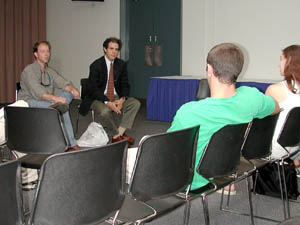 “It
would be a mistake for individual citizens to react in ways that the terrorists
planned. One of the objectives of terrorist is to provoke fear and conflict.
We must not allow this to happen,” Ware said.
“It
would be a mistake for individual citizens to react in ways that the terrorists
planned. One of the objectives of terrorist is to provoke fear and conflict.
We must not allow this to happen,” Ware said.
Fear and its management were the focus of remarks by John Bishop, associate vice president for student life and director of the Center for Counseling and Student Development.
Bishop said that fear is present from infancy to death and demonstrates itself in a variety of ways, such as concern of speaking in public or aversion to heights.
After the events of the last week, he said, fear manifested itself and affected people of all ages throughout the country. But, Bishop added, it is how we cope with the fear caused by the terrorists’ actions that is important.
He said it would help if people understand that fear is a natural reaction to an abnormal event, realize that they have overcome fear in the past and can do so again and know they are not experiencing fear alone.
Bishop also said that our country’s diversity is one of its strengths, adding that people from other countries have experienced terrorism, and Americans can learn from others’ knowledge and experiences in this area.
“We cannot eliminate fear from our lives,” Bishop said. “Learning how to manage fear is the key to our own psychological and emotional well- being.”
Nathan Bright, a senior in communication and a sergeant in the Delaware Army National Guard, cautioned against conducting a military campaign based on revenge and impulsive reactions to the terrorist attacks of Sept. 11.
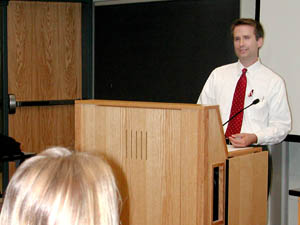 “Terrorists
won’t defend a nation. Terrorists don’t fight to take land or vanquish
conquerors. Their goal is to strike fear and change U.S. policy,” Bright
said. “Make no mistake—America’s military is dedicated, trained and professional,
filled with men and women ready to die if their country calls. But those
who know what to expect in this war are the ones calling for restraint
and careful thought.”
“Terrorists
won’t defend a nation. Terrorists don’t fight to take land or vanquish
conquerors. Their goal is to strike fear and change U.S. policy,” Bright
said. “Make no mistake—America’s military is dedicated, trained and professional,
filled with men and women ready to die if their country calls. But those
who know what to expect in this war are the ones calling for restraint
and careful thought.”
Shae Johnson, a junior in journalism and political science, found herself like many Americans, unable to turn off the television or pull herself away from the events that unfolded in New York City and Washington, D.C. She said she also found herself wondering about the unspeakable evil visited on innocent people and drawing strength from the generous reaction of many Americans to the crisis.
“I’ve wondered at the compassion and grace our nation has shown. I’ve wondered at its heroism and tenderness. I’ve wondered if it’s even possible that we can be undone when we have such determination,” Johnson said. “I’ve wondered at our magnificent country, and the proof that we’ve given to our pledge--One nation under God, indivisible.”
In his remarks closing the forum, Begleiter reflected on his experience in 1979 as a reporter for CNN, hearing about the U.S. embassy personnel being held hostage in Iran.
Begleiter noted that this was the first of many such terrorist attacks against Americans during the decades that followed, including the explosion at the American military barracks in Beirut in 1983 that claimed the lives of 241 U.S. Marines.
“As we all try today to make sense out of the seemingly
senseless violen ce,
as we all seek answers and solutions to terrorism, may I offer a word of
caution,” Begleiter said. “Just as the World Trade Center and Pentagon
attacks were part of a long-running history, so will be the aftermath of
last week’s attack on America. We will all be reading and hearing about
the aftermath for years to come. And one day, regrettably, there will probably
be another occasion like ours here today, when the horrors of Sept. 11,
2001, will be recalled as part of a continuing pattern of terrorism.”
ce,
as we all seek answers and solutions to terrorism, may I offer a word of
caution,” Begleiter said. “Just as the World Trade Center and Pentagon
attacks were part of a long-running history, so will be the aftermath of
last week’s attack on America. We will all be reading and hearing about
the aftermath for years to come. And one day, regrettably, there will probably
be another occasion like ours here today, when the horrors of Sept. 11,
2001, will be recalled as part of a continuing pattern of terrorism.”
The audience left the Bob Carpenter Center in silence, while images of the World Trade Center and Pentagon tragedies flashed onto the screen above the stage. As they returned to campus, some headed for home and others participated in dozens of discussion across campus. As they walked toward the Ribbon Garden, the Memorial Hall carillon chimed a steady peal—every four seconds—each representing the lives lost as a result of the Sept. 11 terrorist attacks.

